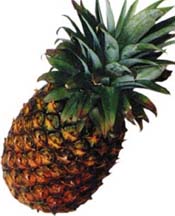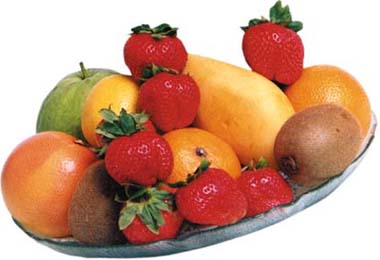|
Diet controversy Can fruits cause cancer? By Annie Yeung |
|
Said Mr. Chau: “The probability is especially high for oesophagus cancer.” Mr. Chau, the president of the Vegetarian Society of Hong Kong and the director of the Produce Green Foundation, explained that the human oesophagus is very narrow. After meals, the oesophagus is filled with meat and carbohydrates. If people then eat fruit, the digestion of the fruit is hindered. |
Courtesy of Mr. Samuel Li |
|
“Of all foods, fruits are the easiest to digest,” he said. “Digesting fruit takes less than an hour or even as fast as 10 minutes, whereas the digestion of meat may take 4 to 10 hours.” When fruit is stuck in the oesophagus, it decays and becomes toxic substances. These toxic substances, when accumulated inside the body, cause problems like cancer. However, the idea of fruit causing cancer does not gain much support from dietitians in Hong Kong. Mr. Samuel Li Lok-shing, a registered dietitian and the author of Healthy Eating, considered the idea “ridiculous”. “It is simple physiology that the human digestive system is a multi-system,” said Mr. Li. “Different foods are treated by different enzymes. “So the digestion of one type of food does not preclude digestion of the other.” Ms Shing Yuk-yiu, who holds a bachelor's degree in nutrition and is a registered dietitian, agrees. “When food enters the stomach,” said Ms Shing, “it has already become relatively unidentifiable and is mixed together.” She said that when food is mixed up in the digestion process, it is not important whether people take meat first or fruit first. Another dietitian, Ms Sidney Leung Lai-king, said, “It is untrue that fruit is digested faster than meat.” “Fruit contains lots of fibre, which is insoluble.” Meat, on other hand, contains less fibre. Therefore, fruit is digested at a slower rate than meat. |
Courtesy of Mr. Samuel Li |
|
As to a suitable time for eating fruit, Mr. Chau said between meals is best. He said, “We should not have fruit immediately before or after a meal.” However, Mr. Li said the opposite is true. Fibre in fruit helps to absorb cholesterol and excrete it. Cholesterol, once accumulated, narrows blood vessels and leads to heart disease. He added that fruit is rich in vitamins, especially vitamin C and carotene, which are antioxidants. These antioxidant substances are believed to prevent cancer. While Mr. Li recommended that fruit should be taken after meal, Ms Shing and Ms Leung said the timing of having fruit is not important. “It is the total amount of nutritional intake that matters,” said Ms Shing. “As long as the diet is balanced, it does not matter when one eats fruit,” said Ms Leung. While the suitable time for having fruit arouses debate among professionals, the public is less concerned. Ms Sunt Yiu-chu, a housewife, said: “I do not believe that having fruit after a meal is cancer-causing. My family and I always have fruit after a meal. This is our habit.” Father Henry Ng Kwok-po looks at the issue from another perspective. “I personally do not believe that having fruit after meal is cancer-causing,” said Father Henry. “But if there is medical evidence strong enough to support this and people still eat fruit, they are committing suicide.” “This violates the ‘Thou shalt not murder’ rule in the Ten Commandments.” |
 Staying awake
Staying awake
December 1997
[Editorial] [Letters] [Answer] [News] [Social] [Photo] [Culture] [Education] [Channels] [Science] [Celebrity]
Comments Editor-in-Chief Electronic Editor